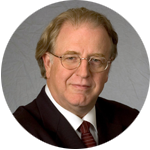
Gene Policinski is president and chief operating officer of the Freedom Forum Institute. Email him at
gpolicinski@freedomforum.org
and follow him on Twitter at @genefac.
Let’s chat for just a moment about free speech.
Many of us have been talking about that very subject recently, from NBA stars and league executives to Chinese government officials, from President Trump to journalists and members of Congress.
Some ground rules for our conversation: The First Amendment protects us from government attempts to control what we say, or from punishment simply for having said it. Freedom of speech — one of five freedoms in the amendment — offers no protection from private companies or individuals who don’t like what we say or hold other views.
The First Amendment only applies in the United States. Other nations may have rules or laws that in some fashion say they protect or really do protect freedom of speech, but none has quite the same strong constitutional protection that we have in the U.S.
And even after 220-plus years, we’re still working out how First Amendment freedoms apply here to everyday situations. Let’s continue the conversation with some real-life examples.
The National Basketball Association has been working for several decades to build its audience in China, where it’s reported more people watch NBA games on TV than do people in this country. A carefully crafted combination of sports and marketing took a real hit in a matter of days recently, after a Houston Rockets executive tweeted an innocuous message of support for protesters in Hong Kong — who it’s worth noting, were protesting in part any attempt by Chinese officials to limit their free speech. The tweet: “Fight for freedom. Stand with Hong Kong.”
Chinese state television stopped broadcasting and streaming the Rockets’ games. Pre-season game broadcasts of several other NBA teams were dropped. Government-controlled Chinese companies dropped their NBA-related sponsorships. Banners touting NBA stars and events were torn down from buildings. And state-owned news media called on NBA players and executives to be more “respectful” of that nation’s internal policies and to consider how “rioters” in Hong Kong pose a threat to life and property there.
China makes no pretense of protecting free speech when it involves the government’s policies there — so yet another lesson: While our freedom of speech is protected from our government, it affords no such defense against other governments.
President Trump this week threatened this week to sue CNN, following release of “undercover” video by the self-styled conservative media criticism operation called “Project Veritas,” which purports to demonstrate bias against him by CNN.
One hurdle such a lawsuit will face is that the First Amendment’s provision for free speech and free press don’t have a “fairness” requirement. While our laws do allow challenges to speech that is immediately threatening, or is libelous, there’s no such provision for requiring anyone — from a cable network to any one of us — to be nice or “fair” when speaking about a politician. The First Amendment does provide that Trump or any other political officeholder can use his or her own free speech rights — in his case, a Twitter account with a massive following — to counter such alleged bias.
Moving from the courtroom to Congress, there are suggestions of future laws to prevent hateful speech, speech that glorifies violence, to ban so-called “deep fake” videos (which use new technology to falsify video images and scenes) or to filter out what someone would determine are false and misleading statements about political candidates. Most, if not all, of those efforts start with good intentions: to make our society a more civil, honorable place.
But on the pragmatic level, each runs up against a free-speech concept strongly held in place so far by the U.S. Supreme Court: That such social issues and values involving free expression should be settled by public debate and discussion, not by court or legislative decision.
Yes, such debates and discussions may well have a price or penalty for participation — starting with no guarantee of civility or fair play. NBA superstar LeBron James — despite a reputation for speaking out in defense of those challenging authority — nonetheless faced a Twitter firestorm for comments he made that many saw as critical of the original Hong Kong tweet, though he denies that intent. The exchanges between Trump and his critics carry a special vitriol, which damages his reputation with some and damages his critics’ standings with others.
In the end, we all may need to see, hear or read ideas that offend, anger or even sicken us — across the widest possible spectrum of views if only, as one Supreme Court justice once wrote, to be better prepared to argue against them.
To speak frankly, that’s how free speech works.
